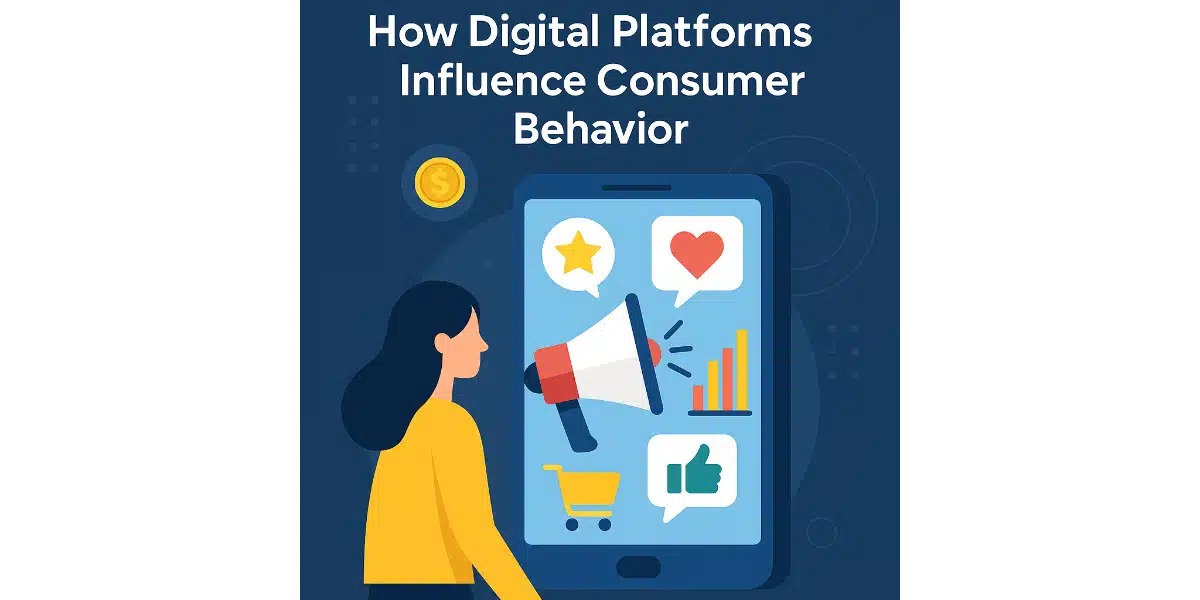In the digital age, consumer behavior is evolving rapidly, shaped largely by the growing dominance of online platforms. From e-commerce websites to social media networks and mobile apps, digital platforms have become central in guiding consumer decisions, preferences, and purchase patterns. With personalized ads, recommendation algorithms, influencer marketing, and real-time feedback loops, brands are gaining unprecedented access to user behavior — and consumers, in turn, are being subtly nudged toward specific actions and choices. A recent look by Europeanbusinessreview explored how these technological systems are not just tools for commerce, but architects of new consumer habits.
The Role of Personalization and Targeted Content
Digital platforms utilize advanced data analytics and artificial intelligence to track user behavior, preferences, and engagement. Based on this data, they deliver highly personalized content that is tailored to individual interests. For example, a consumer who frequently browses fitness gear might be shown ads for protein supplements or exercise apps, reinforcing their interests and nudging them toward specific brands or products.
This personalization fosters a sense of relevance and trust in digital content, making users more likely to convert — whether by making a purchase, signing up for a service, or following a brand. It also shortens the consumer journey, moving users from awareness to decision faster than traditional marketing methods.
Influence of Social Proof and Online Reviews
One of the most powerful behavioral triggers on digital platforms is social proof. Consumers often look at product reviews, ratings, testimonials, and influencer endorsements before making a decision. Platforms like Amazon, Yelp, and TripAdvisor thrive on user-generated content that helps others assess the quality and value of products and services.
Social media platforms also play a vital role. Influencers with large followings can significantly affect purchasing decisions, especially among younger demographics. These endorsements often feel more authentic than traditional ads, making them a key strategy for digital marketing.
Convenience and Instant Gratification
Digital platforms have revolutionized the concept of convenience. With one-click checkouts, same-day delivery, and instant access to digital products, consumers are increasingly valuing speed and ease over other factors. Platforms like Amazon Prime and food delivery apps like Uber Eats or DoorDash have conditioned users to expect near-instant results, which has fundamentally shifted their expectations across industries.
This emphasis on convenience drives consumers to remain loyal to platforms that offer seamless, frictionless experiences. The easier it is to interact with a brand or product, the more likely a consumer is to engage repeatedly.
The Psychology of Algorithms and Endless Scroll
Another way digital platforms influence behavior is through algorithm-driven content feeds. Whether it’s TikTok’s For You Page, Instagram’s Explore tab, or YouTube’s autoplay feature, users are constantly exposed to new content based on what the platform believes they want to see. This creates an immersive experience that often leads to longer usage times, more interactions, and greater exposure to commercial content.
These algorithms are designed to reward engagement, which means that the most addictive and emotionally resonant content rises to the top — further shaping consumer tastes and priorities over time.
Behavioral Data and Predictive Modeling
Data collected from digital interactions is not just used to understand current behavior; it’s also used to predict future actions. Platforms use predictive analytics to suggest what consumers might need next, whether it’s recommending a new show based on viewing history or suggesting grocery items based on previous purchases.
This proactive approach keeps users engaged and often leads to impulse buying, especially when combined with limited-time offers, countdown timers, and other urgency-inducing tactics.
Challenges and Ethical Considerations
While digital platforms offer incredible convenience and value, they also raise important ethical concerns. The constant tracking of behavior, lack of data transparency, and the psychological impact of endless scrolling can lead to digital fatigue, decision overload, or even addiction. Consumers are also becoming more concerned about how their data is being used, leading to increased demand for privacy and digital autonomy.
Marketers and platform developers must strike a balance between personalization and privacy, engagement and exploitation. Transparency, ethical AI use, and consumer consent are becoming vital parts of building long-term trust.
Final Thoughts
Digital platforms have undeniably reshaped the landscape of consumer behavior. Through personalization, convenience, social influence, and algorithmic control, these platforms now play a central role in how people discover, evaluate, and purchase products and services. As consumers continue to embrace digital-first lifestyles, businesses must adapt by understanding the behavioral science behind platform design and using it responsibly. In a rapidly evolving marketplace, the brands that understand how to ethically leverage these insights will be the ones that thrive.




